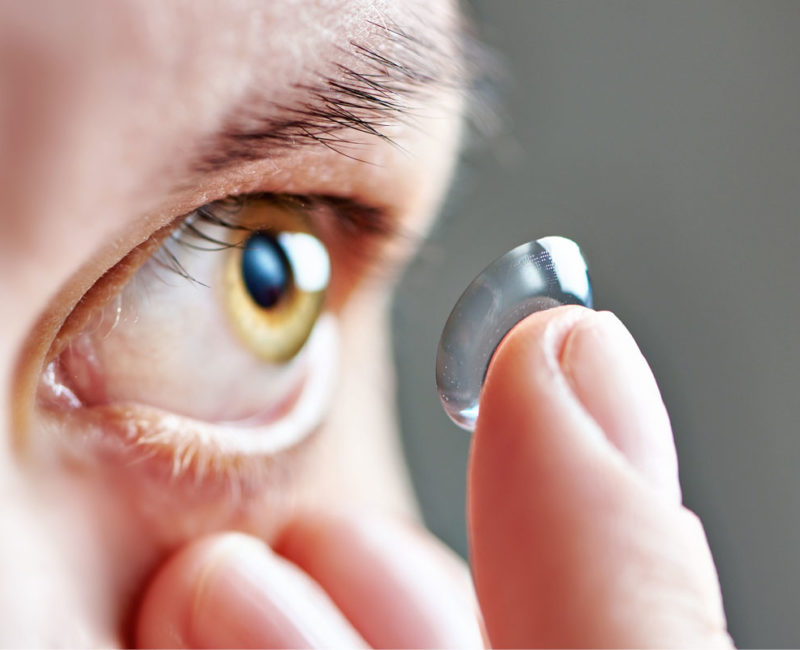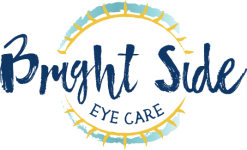Contact Lens Evaluation and Fitting in Lake Worth
- Home
- Contact Lens Evaluation and Fitting

Contact Lens Evaluation in Lake Worth
A contact lens is a medical device that is in direct contact with the tissue of your eye; therefore, it must fit appropriately to maintain the health of your eyes. We offer several types of contact lens fits. At Bright Side Eyecare, you are guaranteed to be fit with the most current contact lens technology. We offer spherical, astigmatism, multi-focal contact lens fittings, and specialty fit for those who have been told they can not wear contacts. Before a patient can be fit with contact lenses, a complete medical and refractive eye examination must be completed. This exam is critical to ensure the good health of your eyes and rule out the possibility of any underlying condition that may prevent contact lens use. Children are also contact lens candidates, only limited by a willingness to participate and responsibility to properly care for the lenses.
What Does A Contact Lens Evaluation and Fitting Entail?
If you choose to wear contacts, it is crucial that they fit comfortably and correctly and that you are aware of appropriate contact lens care. A comprehensive eye exam to check your overall eye health and determine eyesight prescription, as well as a contact lens fitting evaluation, are two parts of the process to get you ready for contact lenses.
- Comprehensive Eye Exam
- Visual Acuity
Visual acuity measurements evaluate how clearly each eye is seeing. Reading charts are frequently used during this test.
- Preliminary Tests
Preliminary tests may include evaluations of depth perception, peripheral or side vision (visual field), eye muscle movements, color vision, and how your pupils react to light. Our technician usually completes these tests.
- Keratometry
Your eye doctor will focus a circle of light on your cornea to measure its reflection. This test tells your optometrist the curvature of the cornea. This is commonly performed for accurate contact lens fitting.
- Refraction
A refraction test determines the lens power you need to compensate for nearsightedness, farsightedness or astigmatism. Your eye doctor may use eye drops during this test to keep your eyes from changing focus.
- Eye Focusing
An eye-focusing test determines how well your eyes focus, move, and work together. This test helps your doctor see problems that prevent your eyes from focusing effectively or keeps them from working well together.
- Eye Health Examination
Dr. Baker and her team will either perform a dilated exam with or without the use of our retinal photography machine. Images captured by the camera serve as screenings for cardiovascular, intracranial, autoimmune, and infectious diseases that may affect the rest of the body.
- Contact Lens Fitting in lake worth
The contact lens business is constantly coming up with new innovations to make contacts more comfortable, practical, and affordable. In order to determine the type of contacts that are best for you, one of the first stages in a contact lens consultation is to talk with your eye doctor about some lifestyle and health factors.
You should think about things like whether you prefer monthly or daily disposable lenses, as well as soft versus rigid gas permeable (GP) lenses, among other choices. Dr. Baker may have specific suggestions for the best type or brand to meet your expectations for the best possible comfort and vision if you have any specific eye conditions, such as astigmatism or dry eye syndrome.
When it comes to contact lenses, there is no one-size-fits-all. For your contact lenses to fit correctly, your eye specialist will need to take some measurements. Uncomfortable contact lens wear can result in blurry vision, ocular damage, and discomfort. Dr. Baker will collect the following measurements to fit you for contact lenses:
- Corneal Bending
Your doctor will measure the curvature of the cornea, or front surface of the eye, to ensure that the fitting curve of the lens correctly matches the curve of your eye. The correct slope for your contact lenses is determined by measuring the curvature with a device known as a keratometer. Because an astigmatized eye’s cornea is not exactly round, the best vision and lens fit would be achieved by using a “toric” lens, which is made especially for an astigmatized eye. In some circumstances, your eye doctor might opt to use a mapping of the corneal surface, known as corneal topography, to measure your cornea in greater detail.
- Iris or Pupil Size
Your eye doctor may use a tool called a biomicroscope or slit lamp, as well as a ruler or card, to physically measure the size of your pupil and iris (the colored portion of your eye). If you’re thinking about using specialty lenses, such as Gas Permeable (GP) contacts, this measurement is particularly crucial.
- Evaluation of Tear Film
Dry eyes is one of the most typical issues that arise when wearing contact lenses. Your eyes will feel dry, irritated, and itchy if the contact lenses are not kept sufficiently hydrated and wet. Your doctor will want to make sure that you have enough tear film to keep the lenses comfortable and moist, especially if you have dry eye syndrome. If not, contact lenses might not be a good vision choice for you.
- Trial of Contact Lenses and Prescription
Before finalizing and ordering your lenses, the eye doctor may ask you to put on a pair of lenses to ensure fit and comfort after determining which pair of lenses might work best for your eyes. Before the doctor examines the fit, movement, and tearing in your eye, the aide or doctor would insert the lenses and leave them in for 15 to 20 minutes. Your eye doctor will order the lenses for you if they seem to fit well after the fitting. In addition, your eye doctor will give you care and hygiene instructions, such as how to put on and take off contact lenses and, if necessary, how long to wear them at one time.
- Follow-up
To ensure that your contact lenses in Lake Worth are fitting correctly and that your eyes are adjusting properly, Dr. Baker may ask you to schedule a follow-up visit. You should see your eye specialist as soon as possible if you have pain or dryness in your eyes. Your eye specialist might decide to experiment with a different lens, a different disinfecting solution for contact lenses in Lake Worth, or a change in how frequently you wear them.


